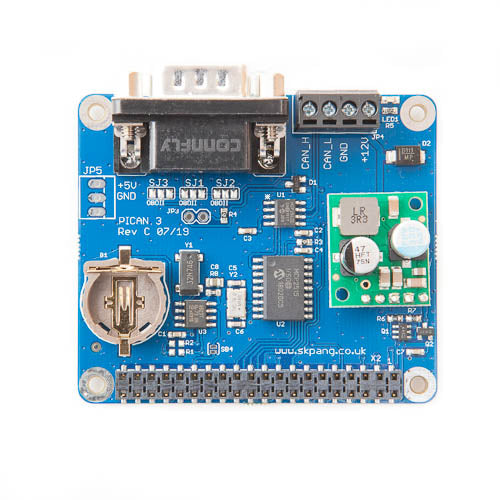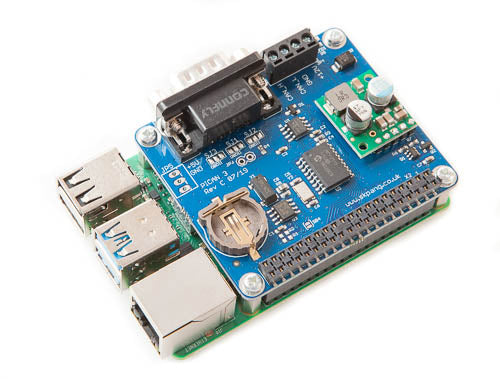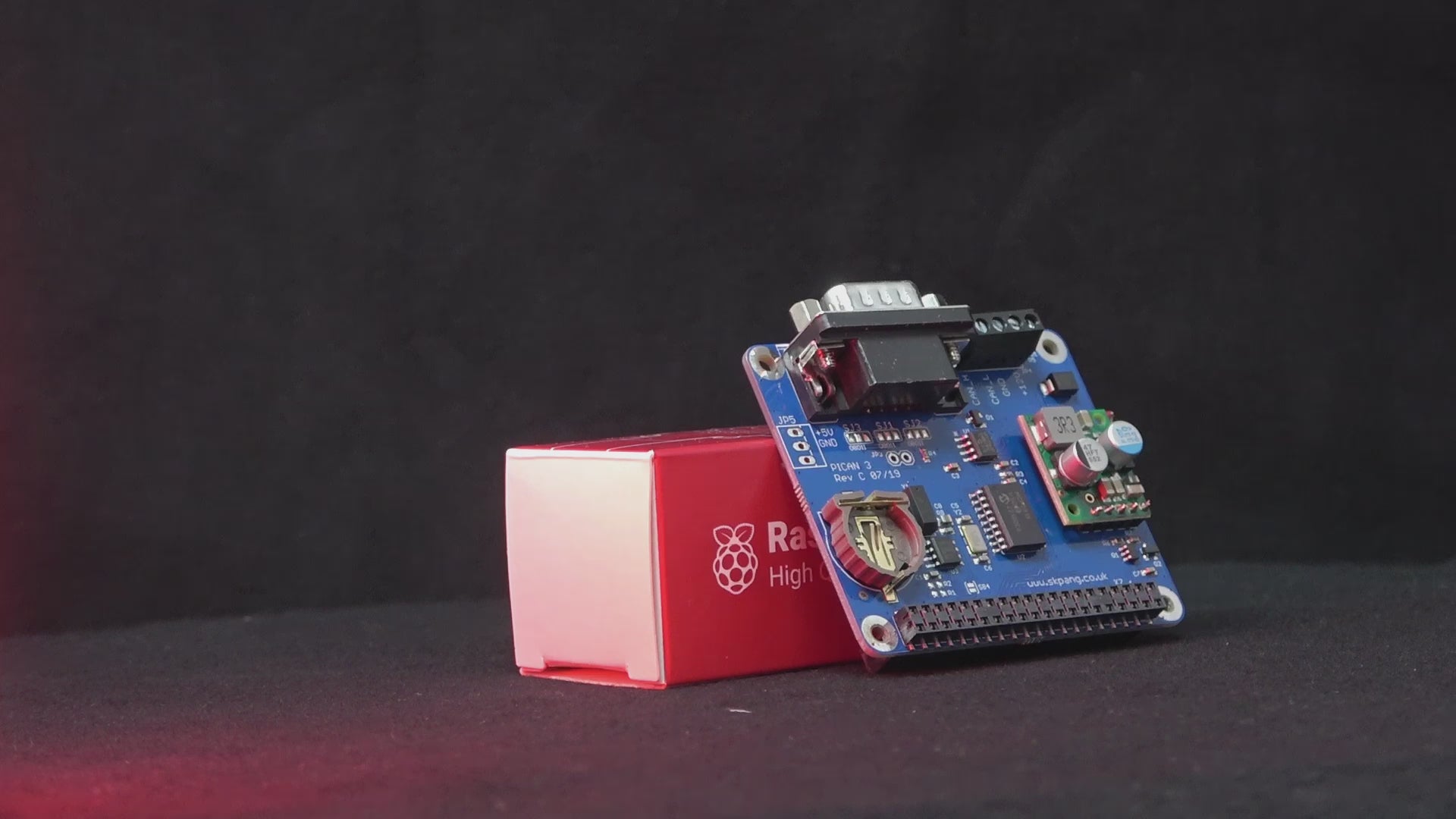Das PiCAN 3 Board ist der Nachfolger der beliebten PiCan 2 Serie, und bringt vor allem Unterstützung für den Raspberry Pi 4 mittels eines 3 A SMPS. Mit der eingebauten Echtzeituhr ist es optimal für Datenlogging und viele weitere Anwendungen mittels CAN.
Es stellt den CAN-Bus für den Raspberry Pi zur Verfügung. Es basiert auf dem Microchip MCP2515 CAN controller mit dem MCP2551 CAN transceiver. Die Verbindungen erfolgen mittels DB9 oder einem 3-Pin Schraub-Terminal. Das eingebaute 3 A SMPS hat auch für den Pi 4 genügend Leistung.
Einfach zu installierender SocketCAN Treiber. Programmierung in C oder Python.
Kompatibilität:
- Alle Raspberry Pi Platinen mit 40 pin Header
- d.h. Pi Zero Series / Pi 1A+ / Pi 1B+ / Pi 2B / Pi 3B / Pi 3A+ / Pi 3B+ / Pi 4)
Der PiCan 3 ist mit dem Raspberry Pi 4 kompatibel!
Merkmale
- CAN v2.0B at 1 Mb/s
- High speed SPI Interface (10 MHz)
- Standard und extended data und remote frames
- CAN Verbindung via standard 9-Pol sub-D connector oder Schraub-Terminal
- Kompatibel mit OBDII Kabel
- Lötbrücke um andere Konfiguration für den DB9 Verbinder (SUB-D Connector) einzustellen
- bereit für 120Ω Terminator
- bereit für serial LCD
- LED Indikator
- Foot print für zwei mini Taster
- vier Befestigungslöcher kompatibel mit dem Pi Hat Standard
- SocketCAN Treiber, erscheint als can0 für die Anwendung
- Interrupt RX auf GPIO25
- 5 V 3A SMPS um Raspberry Pi und Zubehör vom SUB-D Connector oder dem Schraubterminal
- Verpolschutz
- Hoch effizientes Switching Mode Design
- 7 V bis 24 V Spannungsbereich (Eingangsspannung) (Stand 8.6.)
- Echtzeituhr, batteriegestützt (Batterie nicht im Lieferumfang, benötigt CR1125)
-
Befestigungsschrauben
Vier Befestigungsschrauben im Lieferumfang - HINWEIS: Der maximale CAN-Spannungspegel beträgt 4v.
Lieferung ohne Raspberry Pi 4!
Empfohlenes Zubehör:
- PiCan 3 Gehäuse, kompatibel mit PiCan 3 und Raspberry Pi 4
Dokumente
- Benutzerhandbuch
- Schaltplan
- Driver Installation
- Schreib dein eigenes Programm in Python
- Python Beispiel
English description
The PiCAN 3 board is the successor to the popular PiCan 2 series, primarily offering support for the Raspberry Pi 4 through a 3 A SMPS. With its built-in real-time clock, it is ideal for data logging and many other applications via CAN.
It provides CAN-bus access for the Raspberry Pi. It is based on the Microchip MCP2515 CAN controller with the MCP2551 CAN transceiver. Connections are made via DB9 or a 3-pin screw terminal. The built-in 3 A SMPS provides enough power for the Pi 4 as well.
Easily installed SocketCAN driver. Programming in C or Python.
Compatibility:
- All Raspberry Pi boards with a 40-pin header
(i.e., Pi Zero Series / Pi 1A+ / Pi 1B+ / Pi 2B / Pi 3B / Pi 3A+ / Pi 3B+ / Pi 4)
The PiCan 3 is compatible with the Raspberry Pi 4!
Features:
- CAN v2.0B at 1 Mb/s
- High-speed SPI interface (10 MHz)
- Standard and extended data and remote frames
- CAN connection via standard 9-pin sub-D connector or screw terminal
- Compatible with OBDII cable
- Solder bridge to set different configurations for the DB9 connector (SUB-D connector)
- Ready for 120Ω terminator
- Ready for serial LCD
- LED indicator
- Footprint for two mini buttons
- Four mounting holes, compatible with Pi Hat standard
- SocketCAN driver, appears as can0 for applications
- Interrupt RX on GPIO25
- 5V 3A SMPS to power the Raspberry Pi and accessories from the SUB-D connector or screw terminal
- Reverse polarity protection
- High-efficiency switching mode design
- 7V to 24V input voltage range (as of version 8.6)
- Real-time clock, battery-backed (battery not included, requires CR1125)
- Mounting screws
- Four mounting screws included
NOTE: The maximum CAN voltage level is 4V.
Raspberry Pi 4 not included!
DocumentsSicherheitsangaben
- Lesen Sie die Bedienungsanleitung sorgfältig durch, bevor Sie das Produkt verwenden.
- Stellen Sie sicher, dass alle Montage- und Installationsanweisungen des Herstellers sorgfältig befolgt werden.
- Verwenden Sie das Produkt nur für den vorgesehenen Zweck.
- Die unsachgemäße Nutzung dieses Produkts kann zu schweren Verletzungen oder Sachschäden führen.
- Nicht für Kinder unter 10 Jahren geeignet.
- Bei unsachgemäßer Verwendung besteht eine Verletzungsgefahr.
- Dieses Produkt entspricht den geltenden Sicherheitsanforderungen der Europäischen Union.
- Dieses Produkt wurde gemäß der GPSR geprüft, die sicherstellt, dass alle relevanten Sicherheitsanforderungen für Konsumgüter eingehalten werden.
Nachverfolgbarkeitsinformationen
Jedes Produkt verfügt über eines oder mehrere der folgenden Merkmale:
- Ein CE-Kennzeichen, das die Einhaltung der Sicherheits-, Gesundheits- und Umweltschutzanforderungen der Europäischen Union anzeigt.
- Eine eindeutige Serien- oder Chargennummer, um die Nachverfolgbarkeit zu gewährleisten und bei Bedarf Rückrufaktionen zu unterstützen.
- Hersteller- und Importeurangaben für den Kundensupport und Sicherheitsanfragen.
Überwachung und Berichterstattung von Vorfällen
Für den unwahrscheinlichen Fall eines Produktproblems haben wir Verfahren implementiert, um:
- Kundenbeschwerden zeitnah bearbeiten.
- Schwerwiegende Vorfälle über das EU Safety Gate/RAPEX-System melden.
- Mit den Marktüberwachungsbehörden zusammenarbeiten, um die öffentliche Sicherheit zu gewährleisten.
Kontakt:
- Email: support [@] pi3g.com
- Telefon: 0341 / 392 858 40
Dieses Produkt ist vollständig mit allen geltenden EU-Vorschriften konform, um die Sicherheit unserer geschätzten Kunden zu gewährleisten.



